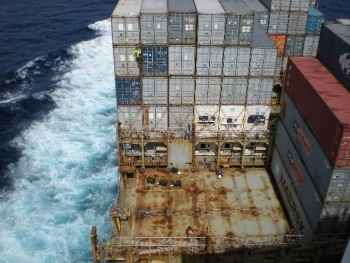
NNSA plays a vital role in the U.S. government’s efforts to prevent, counter, and respond to a terrorist or other adversary actor with a nuclear or radiological device by providing expertise, practical tools, and technically informed policy recommendations to advance U.S. nuclear counterterrorism and counterproliferation objectives.
NNSA’s counterterrorism, counterproliferation and nuclear incident response programs are ready to respond to stolen or misplaced radioactive materials, a nuclear weapon out of the control of a nation-state (“loose nuke”), or an improvised nuclear device. In addition, the NNSA works to reduce the danger posed by proliferant nations pursuing a nuclear weapons capability.

The mission of the Office of Counterterrorism and Counterproliferation is to counter these threats through innovative science, technology, and policy-driven solutions. To effectively prepare for these threats, the Office of Counterterrorism and Counterproliferation considers a range of potential scenarios. For example, a nuclear or radiological terrorism scenario, or an accidental release of commercial radiological material would require an immediate and coordinated government response informed by the unique nuclear expertise of NNSA and its national laboratories and sites. NNSA would answer questions such as: What is the potential size of the area that has been affected? Would it be safer to shelter-in-place or evacuate that area? Where did the material and components used to make the improvised device come from? How best to disable the improvised device and ensure it is safe to transport to safe and secure location. If disablement of the improvised device is not a viable option, what is the worst-case scenario?
Underpinning the answers to these and many other questions is: science. NNSA has decades of technical expertise from building and managing the U.S. nuclear weapons stockpile. NNSA uses our nuclear weapon design expertise, unique nuclear facilities, and supercomputing capabilities of the national laboratories to understand the full range of potential nuclear threat vulnerabilities, both what is potentially within a terrorist’s reach and what proliferant nations are seeking, and options to counter both.
To prevent nuclear terrorism, NNSA works with other U.S. government agencies, our international partners and allies, and international agencies to support efforts to secure materials of concern. Our technical capabilities also support the development of training and tools to disable improvised nuclear devices, consequence management, and technical nuclear forensics and attribution efforts, both before and after a potential nuclear detonation.
The Office of Counterterrorism and Counterproliferation also works to reduce the threat from proliferant nations that pursue a nuclear weapons capability. Bringing our technical expertise and insights to bear, the Office works with other U.S. government agencies to enhance U.S. nuclear counterproliferation capabilities, and to develop tools and techniques to impede the efforts of proliferant nations to gain the material and technologies necessary to establish a nuclear weapons program.
Reducing the threat of counterterrorism involves more than understanding the technical aspects of the problem.
NNSA also helps reduce terrorism risks associated with nuclear/radiological materials, facilities, or weapons of mass destruction (WMD)-related materials through outreach and training that strengthens counterterrorism capabilities and policies at home and overseas. For example, domestically, NNSA designs, produces, and conducts tailor-made tabletop exercises for public and private sector partners that have key roles and responsibilities in nuclear security. Designed to build teamwork and an in-depth understanding of the roles and responsibilities of agencies charged with responding to terrorist-related radiological, nuclear, or WMD-related incidents, these private—but unclassified—exercises bring together federal, state, and local decision-makers and emergency responders.
Nuclear/radiological terrorism is truly a global issue—a nuclear terror event anywhere in the world would be catastrophic. NNSA works bilaterally with key international partners and advanced civil nuclear countries around the world to address shared nuclear/radiological terrorism concerns and to jointly reduce associated risks. This bilateral and multilateral outreach includes leading mutually beneficial interagency nuclear counterterrorism dialogues that allow for regular discussion among senior, interagency national officials on topics that are critical to reducing terrorist risks associated with civilian nuclear facilities and materials. Moreover, NNSA works with key partners to lead exchanges on technologies and approaches to secure and protect nuclear facilities and materials, and jointly conduct nuclear emergency preparedness and response exercises and training. These efforts include supporting multilateral nuclear counterterrorism initiatives such as the Global Initiative to Combat Nuclear Terrorism and other international nuclear security initiatives.
